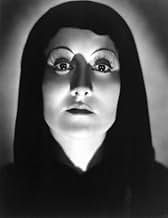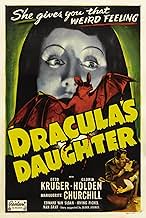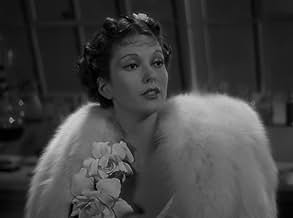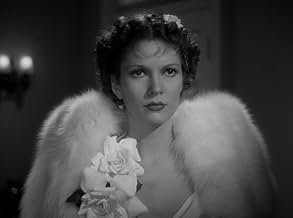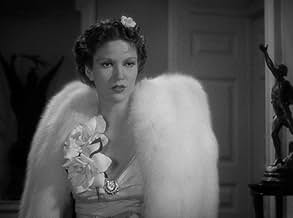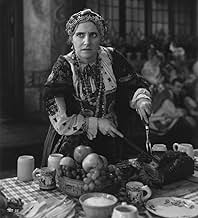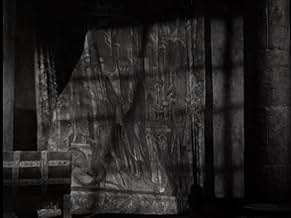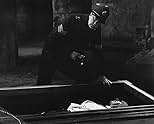NOTE IMDb
6,3/10
8,7 k
MA NOTE
Lorsque la comtesse Marya Zaleska apparaît à Londres, des événements mystérieux se produisent, conduisant le Dr Von Helsing à penser que la comtesse doit être un vampire.Lorsque la comtesse Marya Zaleska apparaît à Londres, des événements mystérieux se produisent, conduisant le Dr Von Helsing à penser que la comtesse doit être un vampire.Lorsque la comtesse Marya Zaleska apparaît à Londres, des événements mystérieux se produisent, conduisant le Dr Von Helsing à penser que la comtesse doit être un vampire.
- Réalisation
- Scénario
- Casting principal
- Récompenses
- 1 victoire et 1 nomination au total
Halliwell Hobbes
- Hawkins
- (as Halliwell Hobbs)
Claud Allister
- Sir Aubrey
- (as Claude Allister)
Agnes Anderson
- Elena
- (non crédité)
John Blood
- Bobby
- (non crédité)
David Dunbar
- Motor Bobby
- (non crédité)
Douglas Gordon
- Attendant
- (non crédité)
Owen Gorin
- Groom's Friend
- (non crédité)
Avis à la une
Right after the success of James Whale's "Bride of Frankenstein" (sequel to "Frankenstein", also directed by Whale), Universal Studios decided to make a sequel to their other horror classic film, Tod Browning's "Dracula". Story says that the studio chose Whale again for the project, but his script proved to be too outrageous and subversive that was immediately rejected. It would be Garret Fort, writer of the first "Dracula", who would give flesh to the sequel's screenplay and the experienced director Lambert Hillyer was set to direct it. Like "Bride", this sequel would be focused on a feminine version of the previous monster; it's name, "Dracula's Daughter".
The film starts right after the original ends, with Count Dracula killed by Professor Van Helsing (Edward Van Sloan), however, to his misfortune, he is arrested for the murder of the Transylvanian nobleman and sent to prison as nobody believes he killed an ancient vampire. Realizing that nobody will believe him, Van Helsing asks the help of his dear friend, Dr. Jeffrey Garth (Otto Kruger), a former student of his who has become a prominent psychiatrist. While this events happen, a mysterious woman steals Dracula's body and a new series of murders start, complicating Van Helsing's defense and Garth's investigation. To make things worse, Countess Marya Zaleska (Gloria Holden) arrives and her seductive charms will prove too strong for Garth to resist them.
Unlike "Frankenstein", where there was still material in the source novel to build up a sequel; in "Dracula"'s case things get complicated, as the monster is effectively killed at the end. However, Garret Fort builds up an original story of mystery, horror and even nods to screwball comedy. "Dracula's Daughter"'s themes of betrayal, deception, and the quest for redemption are dark indeed, but Fort manages to add some light-hearted moments that break the suspense in an appropriate manner. Another highlight is that the vampire's sex appeal is enhanced and explored even further than posterior sequels of the now-franchise.
Director Lambert Hillyer had a big experience directing many low-budget films, ranging from westerns to crime dramas, so he was used to work with similar budget constrains. The movie's strength is in its story, and Hillyer knew it, so he keeps a simple yet very effective style that, while nothing too impressive, manages to create the perfect atmosphere for the plot. With nothing more than his well assembled cast and Fort's excellent screenplay, he conceives a film that maybe won't be remembered as influential, but will surely tell its story properly and deliver what it promises.
The cast is vital in this film, as their job is what sets apart the film from other Universal sequels. Otto Kruger is a very good lead actor, with nice looks and an ease for this kind of characters. He has great chemistry with both Gloria Holden and Marguerite Churchill and his performance is one of the film's highlights. Holden portrays the seductive Countess with power and grace in a complicated role as her character is at the same time dominated by a strong sex appeal and a sad and tragic fate. Churchill is superb in her comedy role, and more than mere comic relief, she adds the touch of screwball comedy to the film, giving her energy and charm. And finally, Edward Van Sloan returns as the experienced Van Helsing, and while his role here is more as a spiritual guide to Kruger, he gives another fine performance.
The film's main weakness is without a doubt its low-budget, that not only forced the choice of Hillyer as a director, but it also made it have less production values than other sequels. In a way, this may had been of help, as Hillyer's style bends together perfectly with low-budget projects and also gave the film a look closer to crime melodrama, which was rising in popularity at the time. Sure, Bela Lugosi is definitely missed, but "Dracula's Daughter" makes up for his absence with a witty (and bold for its time) screenplay and a well-assembled cast.
Time has left this film unappreciated, but there is a lot in there to praise, and while nowhere near the best of the Classic Universal Horror films, "Dracula's Daughter" is better than many of the films of its time, and an essential viewing for any fan of Gothic horror. 7/10
The film starts right after the original ends, with Count Dracula killed by Professor Van Helsing (Edward Van Sloan), however, to his misfortune, he is arrested for the murder of the Transylvanian nobleman and sent to prison as nobody believes he killed an ancient vampire. Realizing that nobody will believe him, Van Helsing asks the help of his dear friend, Dr. Jeffrey Garth (Otto Kruger), a former student of his who has become a prominent psychiatrist. While this events happen, a mysterious woman steals Dracula's body and a new series of murders start, complicating Van Helsing's defense and Garth's investigation. To make things worse, Countess Marya Zaleska (Gloria Holden) arrives and her seductive charms will prove too strong for Garth to resist them.
Unlike "Frankenstein", where there was still material in the source novel to build up a sequel; in "Dracula"'s case things get complicated, as the monster is effectively killed at the end. However, Garret Fort builds up an original story of mystery, horror and even nods to screwball comedy. "Dracula's Daughter"'s themes of betrayal, deception, and the quest for redemption are dark indeed, but Fort manages to add some light-hearted moments that break the suspense in an appropriate manner. Another highlight is that the vampire's sex appeal is enhanced and explored even further than posterior sequels of the now-franchise.
Director Lambert Hillyer had a big experience directing many low-budget films, ranging from westerns to crime dramas, so he was used to work with similar budget constrains. The movie's strength is in its story, and Hillyer knew it, so he keeps a simple yet very effective style that, while nothing too impressive, manages to create the perfect atmosphere for the plot. With nothing more than his well assembled cast and Fort's excellent screenplay, he conceives a film that maybe won't be remembered as influential, but will surely tell its story properly and deliver what it promises.
The cast is vital in this film, as their job is what sets apart the film from other Universal sequels. Otto Kruger is a very good lead actor, with nice looks and an ease for this kind of characters. He has great chemistry with both Gloria Holden and Marguerite Churchill and his performance is one of the film's highlights. Holden portrays the seductive Countess with power and grace in a complicated role as her character is at the same time dominated by a strong sex appeal and a sad and tragic fate. Churchill is superb in her comedy role, and more than mere comic relief, she adds the touch of screwball comedy to the film, giving her energy and charm. And finally, Edward Van Sloan returns as the experienced Van Helsing, and while his role here is more as a spiritual guide to Kruger, he gives another fine performance.
The film's main weakness is without a doubt its low-budget, that not only forced the choice of Hillyer as a director, but it also made it have less production values than other sequels. In a way, this may had been of help, as Hillyer's style bends together perfectly with low-budget projects and also gave the film a look closer to crime melodrama, which was rising in popularity at the time. Sure, Bela Lugosi is definitely missed, but "Dracula's Daughter" makes up for his absence with a witty (and bold for its time) screenplay and a well-assembled cast.
Time has left this film unappreciated, but there is a lot in there to praise, and while nowhere near the best of the Classic Universal Horror films, "Dracula's Daughter" is better than many of the films of its time, and an essential viewing for any fan of Gothic horror. 7/10
This movie literally starts off were "Dracula" finished. Since it is a sequel you would expect only more of the same old routine but "Dracula's Daughter" is surprising original and good on its own. This ain't your average bloodsucking vampire movie.
Thing that was best about this movie is that they came up with a quite original and solid story that goes deep enough and features some strong and interesting characters. It's not like they wanted to surpass the original "Dracula" movie or became too dependent on the events that occurred in that movie. Instead they just tried to be original and create a new and different kind of vampire movie.
Only returning character is professor Von Helsing (why did they ever changed his name?) played by yet again Edward Van Sloan. Van Sloan truly was a fantastic actor, I already loved him in "Dracula" and in this movie he reprises his role with just as much flair. Another actor that impressed me was Irving Pichel as the creepy looking Sandor.
It's definitely a movie worth watching. It never becomes scary, mysterious or tense really but the story and acting are what makes this movie a very solid one.
8/10
http://bobafett1138.blogspot.com/
Thing that was best about this movie is that they came up with a quite original and solid story that goes deep enough and features some strong and interesting characters. It's not like they wanted to surpass the original "Dracula" movie or became too dependent on the events that occurred in that movie. Instead they just tried to be original and create a new and different kind of vampire movie.
Only returning character is professor Von Helsing (why did they ever changed his name?) played by yet again Edward Van Sloan. Van Sloan truly was a fantastic actor, I already loved him in "Dracula" and in this movie he reprises his role with just as much flair. Another actor that impressed me was Irving Pichel as the creepy looking Sandor.
It's definitely a movie worth watching. It never becomes scary, mysterious or tense really but the story and acting are what makes this movie a very solid one.
8/10
http://bobafett1138.blogspot.com/
"Dracula's Daughter" is a trailblazer in many respects. It's the earliest film I can think of that features a truly sympathetic vampire protagonist. It's also the earliest mainstream film that I'm aware of with such a strong lesbian subtext. (Actually, it's not even a "sub" text, it's plain as day!) As you might expect, these rather surprising elements make it a highly memorable viewing experience - perhaps even more memorable than its predecessor, Lugosi's "Dracula," which is basically just a truncated version of Bram Stoker's novel.
Unfortunately, "Dracula's Daughter" misses the mark of greatness that it probably deserves. The film is only about an hour and ten minutes long, so there isn't sufficient time to fully develop Countess Zaleska, the title character. And it's extremely frustrating that the first fifteen minutes or so are basically squandered on a lot of painfully unfunny business involving two comedy constables. The humor has aged really, really badly, unless you somehow find it convulsively hilarious when one of the constables reacts to every strange and dramatic happening around him by saying "oooh..."
I tend to complain that modern-day horror features too much dumb comedy that hurts its credibility, but "Dracula's Daughter" is living proof that studios were injecting silly rubbish into otherwise good horror material as long as seventy years ago!
The serious parts of the film work well, however. Countess Zaleska and her faithful servant, Sandor, have some interesting exchanges about the loneliness of immortality and the darkness of the vampire's universe. The scene when Zaleska burns her father's body is also very moody and dramatic. (How does one get a job like Sandor's, anyway? Don't you think it would be fun to play personal servant to a glamorous female vampire? No? Maybe it's just me, then.)
If the film has another flaw, aside from the comedy, it's the human protagonist, Dr. Garth. Otto Kruger plays the character as stubborn and really rather abrupt. He'll spew a few lines of psycho-babble at the countess, then charge out of the room and leave his job with her half-done at best. A more attentive psychiatrist might perhaps have made for a more sympathetic and proactive hero. As it is, he's basically just an irritating presence who distracts us from the "villains," who are infinitely more interesting and more worthy of our time.
Unfortunately, "Dracula's Daughter" misses the mark of greatness that it probably deserves. The film is only about an hour and ten minutes long, so there isn't sufficient time to fully develop Countess Zaleska, the title character. And it's extremely frustrating that the first fifteen minutes or so are basically squandered on a lot of painfully unfunny business involving two comedy constables. The humor has aged really, really badly, unless you somehow find it convulsively hilarious when one of the constables reacts to every strange and dramatic happening around him by saying "oooh..."
I tend to complain that modern-day horror features too much dumb comedy that hurts its credibility, but "Dracula's Daughter" is living proof that studios were injecting silly rubbish into otherwise good horror material as long as seventy years ago!
The serious parts of the film work well, however. Countess Zaleska and her faithful servant, Sandor, have some interesting exchanges about the loneliness of immortality and the darkness of the vampire's universe. The scene when Zaleska burns her father's body is also very moody and dramatic. (How does one get a job like Sandor's, anyway? Don't you think it would be fun to play personal servant to a glamorous female vampire? No? Maybe it's just me, then.)
If the film has another flaw, aside from the comedy, it's the human protagonist, Dr. Garth. Otto Kruger plays the character as stubborn and really rather abrupt. He'll spew a few lines of psycho-babble at the countess, then charge out of the room and leave his job with her half-done at best. A more attentive psychiatrist might perhaps have made for a more sympathetic and proactive hero. As it is, he's basically just an irritating presence who distracts us from the "villains," who are infinitely more interesting and more worthy of our time.
As the last movie completed before the Laemmles were ousted from control of Universal, DRACULA'S DAUGHTER holds some interest as a place marker, surely; now, the men who had fought the patent trust and had largely given way to the next generation. Yes, Zukor was hanging in as Chairman at Paramount, but with vastly curtailed power; DeMille was beginning his own renaissance -- by becoming a parody of himself -- and Lasky was still fading, although he would continue to produce increasingly ponderous prestige films over the next dozen years. Only Goldwyn would prosper -- but no one liked him.
But this is Dracula's Daughter I'm talking about, and it's just fine. I like Lambert Hillyer's frequently matter-of-fact handling of the movie, with its complicated lesbian and Triple-Goddess subtext. I can't see all the money on the screen (over a quarter of a million dollars -- a huge sum for Universal), but I am amused by the opening, with its "All right, Doctor, you've killed Count Dracula. You're claiming an insanity defense, are you?" attitude.
But this is Dracula's Daughter I'm talking about, and it's just fine. I like Lambert Hillyer's frequently matter-of-fact handling of the movie, with its complicated lesbian and Triple-Goddess subtext. I can't see all the money on the screen (over a quarter of a million dollars -- a huge sum for Universal), but I am amused by the opening, with its "All right, Doctor, you've killed Count Dracula. You're claiming an insanity defense, are you?" attitude.
The best of the Universal Dracula films will always be the one from 1931 with Bela Lugosi, which is one of the best and most iconic Universal Studios horrors. But its follow-ups generally are worth a look; Son of Dracula despite Lon Chaney Jnr's miscast Dracula was much better than expected, being a good-looking film with a lot of atmosphere and at least two scenes among the best of any Universal Studios Gothic horror film but House of Dracula while watchable was disappointing apart from a couple of effective sequences, nice sets and a few good performances but did suffer mainly from having too many ideas and not enough time to explore them.
Dracula's Daughter however is the best of them. Is it as good as the 1931 film? No, but it almost is. Two or three things do bring it down. The humour at the beginning with the cops was incredibly hokey and more overly-silly and misplaced than funny. Otto Kruger is an unappealingly stiff male lead, Garth has some very abrupt decision-making that Kruger overdoes to the point it gets annoying. And while the banter between him and Marguerite Churchill's Janet was very enjoyable and witty there was a little too much of it, it could have taken up less of the film and the film could have focused more on Von Helsing. Personal opinion of course.
On the other hand, Dracula's Daughter has great production values. The costumes and sets are sumptuous and splendidly Gothic and the film's beautifully photographed too. The music score, actually sounding original and not stock, compliments the mood very well and has to be one of the eeriest of any of the music scores in the Universal horrors. Dracula's Daughter is wittily scripted as just as I appreciated the film noir-ish-like direction of Son of Dracula I also appreciated the sombre, moody approach that the direction in Dracula's daughter took. The story, apart from the hokey start, is fun and atmospheric, there is a real eeriness but a poignant edge too. Of individual scenes the scene with the Countess Zaleska and Lilli is infamous and for a reason. Apart from Kruger the acting is good, Marguerite Churchill is amusing and Edward Van Sloan once again brings class to Von Helsing but the most memorable turns are from Irving Pichel and especially Gloria Holden. Pichel is effectively sinister especially towards the end while Holden is unforgettable in the title, subtly creepy but somewhat tragic.
All in all, not as good as the 1931 film but of the Dracula sequels Universal made to me Dracula's Daughter's the best one. 8/10 Bethany Cox
Dracula's Daughter however is the best of them. Is it as good as the 1931 film? No, but it almost is. Two or three things do bring it down. The humour at the beginning with the cops was incredibly hokey and more overly-silly and misplaced than funny. Otto Kruger is an unappealingly stiff male lead, Garth has some very abrupt decision-making that Kruger overdoes to the point it gets annoying. And while the banter between him and Marguerite Churchill's Janet was very enjoyable and witty there was a little too much of it, it could have taken up less of the film and the film could have focused more on Von Helsing. Personal opinion of course.
On the other hand, Dracula's Daughter has great production values. The costumes and sets are sumptuous and splendidly Gothic and the film's beautifully photographed too. The music score, actually sounding original and not stock, compliments the mood very well and has to be one of the eeriest of any of the music scores in the Universal horrors. Dracula's Daughter is wittily scripted as just as I appreciated the film noir-ish-like direction of Son of Dracula I also appreciated the sombre, moody approach that the direction in Dracula's daughter took. The story, apart from the hokey start, is fun and atmospheric, there is a real eeriness but a poignant edge too. Of individual scenes the scene with the Countess Zaleska and Lilli is infamous and for a reason. Apart from Kruger the acting is good, Marguerite Churchill is amusing and Edward Van Sloan once again brings class to Von Helsing but the most memorable turns are from Irving Pichel and especially Gloria Holden. Pichel is effectively sinister especially towards the end while Holden is unforgettable in the title, subtly creepy but somewhat tragic.
All in all, not as good as the 1931 film but of the Dracula sequels Universal made to me Dracula's Daughter's the best one. 8/10 Bethany Cox
Le saviez-vous
- AnecdotesOriginally, Universal wanted to make a sequel based on Bram Stoker's short story 'Dracula's Guest' and negotiated with Stoker's widow Florence. During the talks between the two, it was discovered that Bram Stoker had not complied with one requirement of the U.S Copyright office with his novel 'Dracula', which rendered it public domain in the United States. Because Florence wanted more creative control over the sequel, and Bela Lugosi wanted more money to reprise the role of Count Dracula, Universal instead hired John L. Balderston to write a new story.
- GaffesAlthough the film takes place mostly in London, telephones consistently ring one ring at a time, whereas British phones have always used a double ring.
- Citations
Lady Esme Hammond: Sherry, Marya?
Countess Marya Zaleska: Thank you, I never drink... wine.
- ConnexionsFeatured in Shock Theater: Dracula's Daughter (1959)
Meilleurs choix
Connectez-vous pour évaluer et suivre la liste de favoris afin de recevoir des recommandations personnalisées
Détails
- Date de sortie
- Pays d’origine
- Sites officiels
- Langues
- Aussi connu sous le nom de
- La hija de Drácula
- Lieux de tournage
- Société de production
- Voir plus de crédits d'entreprise sur IMDbPro
- Durée1 heure 11 minutes
- Couleur
- Rapport de forme
- 1.37 : 1
Contribuer à cette page
Suggérer une modification ou ajouter du contenu manquant



